Fenway Park (44 page)
Authors: John Powers
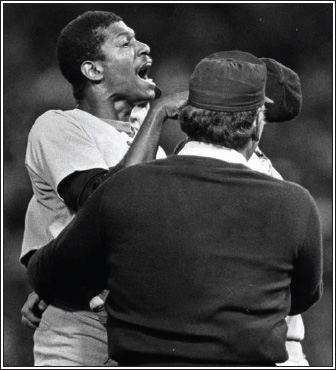
Dennis “Oil Can” Boyd was restrained by a teammate and an umpire as he argued a call during a 1986 playoff game.
Then Dave Henderson, picked up from Seattle in August, whacked another homer off Donnie Moore to tie the score in the ninth. And it was Henderson again in the 11
th
inning, knocking in Baylor with a sacrifice fly to put the Sox ahead, 7-6. “If we lost this game today, it wouldn’t have been fair,” concluded Baylor after Calvin Schiraldi, a mid-season call-up turned closer who had blown the save in Game 4, had set down the Angels in the bottom half of the 11
th
to preserve the Game 5 victory.
Once back in their own yard, the Sox closed out the Angels with a pair of emphatic blowouts. In Game 6, Boston easily evened the series with a 10-4 decision, knocking out starter Kirk McCaskill by way of five runs in the second inning. “Both teams have shown they know how to play and win,” Mauch observed. “Now we’ll find out which one knows how to win when they have to win.”
Not since the 1912 World Series had the Sox won an October postseason series that had gone the distance. But the finale was nearly a walkover. Clemens stifled the Angels while his mates laid a battering on John Candelaria, who gave up seven runs in the first four innings. The Sox outburst was punctuated by Rice’s three-run shot over the left-field wall. “Yogi’s quote gets better and better,” exulted McNamara after his club had banished the Angels by an 8-1 margin to advance to the World Series for the first time in 11 years. “It’s still never over until it’s over. For me, it is a dream come true to get there.”
The Sox hadn’t won the Fall Classic since 1918. But after they had mastered the Mets, 1-0 and 9-3, in the first two meetings at Shea Stadium, the Fenway faithful began believing that they could see it happen in person, even though Boston had been a decided underdog when the Series started. “You look at some of the guys on our ball club,” mused Buckner. “You go down the names, and then you wonder what the bookies were thinking. I think those guys are sorry now. I wish I could have made a bet.”
Boston never had lost consecutive postseason games at home, but New York dealt them two sobering defeats in two days. The Mets knocked around Boyd for a 7-1 triumph in Game 3. Then Bob Ojeda, who had been traded in 1985, mastered his former teammates, as the Mets ran up a 5-0 lead in Game 4 en route to a 6-2 decision that evened the Series. But Hurst, who’d blanked the Mets in the opener, held them off again, 6-2, in Game 5 and the Sox returned to Queens with two chances to win their rings. “Our backs are not at the door,” declared Rice. “Their backs are.”
The Mets seemed all but finished in Game 6 after Henderson’s leadoff homer and Barrett’s RBI single gave Boston a 5-3 lead in the 10
th
inning and Schiraldi had the hosts down to their last strike with two on. But Ray Knight laced a single to score one run and Bob Stanley, who came in to close, uncorked a wild pitch with two strikes on Mookie Wilson that enabled New York to draw even. When Wilson’s bouncing grounder went through Buckner’s legs to score Knight from second, millions of Sox fans, many of whom had awakened children and propped them in front of the TV so that they could bear witness to history, went to bed in shock.
“I had dreamed of this moment,” said Stanley after the Mets had escaped, 6-5, in the only Series game ever decided by an error. “How I would be on the mound for the clincher and how it would wipe out all the bad things. I was there tonight . . . but the dream turned into a nightmare.”
Yet Boston had another chance to end 68 years of autumnal futility. A Sunday rainout enabled McNamara to start Hurst for a third time and the Sox staked him a 3-0 lead in the second inning. Redemption seemed at hand. But New York squared things in the sixth off a tiring Hurst, and went ahead 6–3 the next inning. After Boston had drawn to within a run on Evans’s double, the Mets stung Al Nipper for two more in the bottom of the eighth, and soon were spraying themselves with bubbly. “It’s a wrong ending to a storybook year,” said Henderson as his teammates quietly packed their gear.
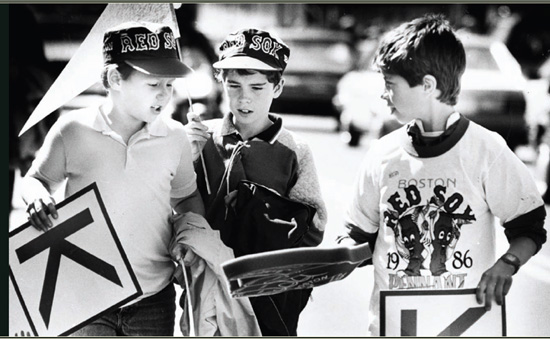
Young Red Sox fans bought up every souvenir in sight to cheer on the 1986 team during postseason play at Fenway.
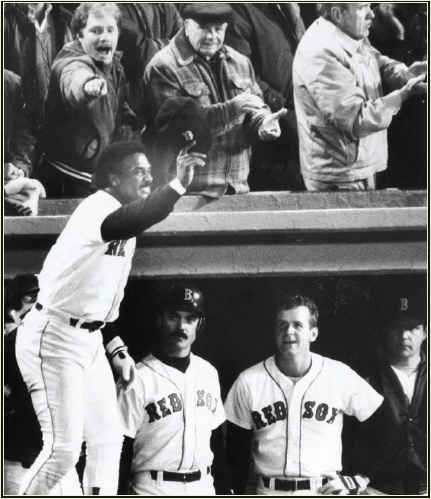
Fenway fans saluted Jim Rice after his three-run homer sealed the Game 7 victory over the Angels in the 1986 AL Championship Series.
BUCKNER’S REDEMPTION
It was October 6, 1986, and Bill Buckner was talking to a Boston TV reporter at Fenway Park about the upcoming postseason for the Red Sox, their first since 1975. “The dreams are that you are going to have a great series and win, and the nightmares are that you are going to let the winning run score on a ground ball through your legs,” said Buckner. “Those things happen, and I think a lot of it is just fate.”
Fate brought Buckner to the plate in the top of the ninth inning of Game 5 of the ALCS in Anaheim against the Angels, who led the game, 5-2, and the series, 3-1. The Angels were three outs away from advancing to their first World Series. Buckner’s single started a rally that concluded with Dave Henderson’s dramatic, final-strike, game-tying homer that helped to propel the Red Sox into the Series.
Fast-forward a couple of weeks to Shea Stadium, to the play in Game 6 of the World Series that propelled the Mets to the world title and unfairly defined Buckner’s career. We can close our eyes and see the videotape of Mookie Wilson’s ground ball, we can hear announcer Vin Scully exclaim, “A little roller up along first . . . behind the bag! It gets through Buckner! Here comes Knight . . . and the Mets win it!”
Buckner played in four decades. He collected more hits (2,715) than either Ted Williams or Joe DiMaggio did. He won a National League batting title in 1980 and was an All-Star in 1981. But that one play, which has been called the Zapruder film of baseball, took on a life of its own and made him the poster boy for the Curse of the Bambino.
Years later, Buckner said, “This is the honest-to-God’s truth. My first thought was, ‘We lost the game.’ The second thought was, ‘Oh man, we get to play the seventh game of the World Series.’ There was no doubt in my mind we were going to win the last game.”
The Sox lost the last game to the Mets, of course, and Buckner was vilified, made the butt of hundreds of bad jokes. He played half of the 1987 season for the Red Sox, and played the final 22 games of his career in Boston in 1990, but then he moved far away, to Boise, Idaho, and for a long time he stayed away, including when the 1986 Sox team was honored in 2006.
In a 2003 interview with the Globe’s Stan Grossfeld, Buckner acknowledged that all was not forgotten. “I still hear stuff,” he said. “I laugh at it. Sports are for teaching young people to deal with success and failure. The saddest thing is, what are you teaching kids today? That you can’t make a mistake? You make an error and you don’t win, so you say, ‘I don’t want to play.’ That’s not what sports is all about.”
On Opening Day 2008, after enduring years of hecklers and worse, Buckner came back to Fenway to throw out the first pitch to former teammate Dwight Evans and received an emotional, four-minute ovation.
“I didn’t think I was going to do it,” said Buckner later. “I told them I’d think about it, but I made up my mind I wasn’t going to come. Then I prayed about it a little, and here I am. Glad I came.”
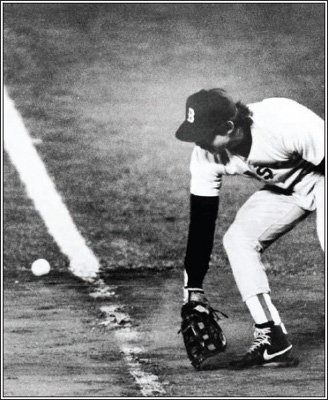
Bill Buckner wiped his eyes during the extended ovation he received when he threw out the first pitch to open the 2008 Red Sox home season.
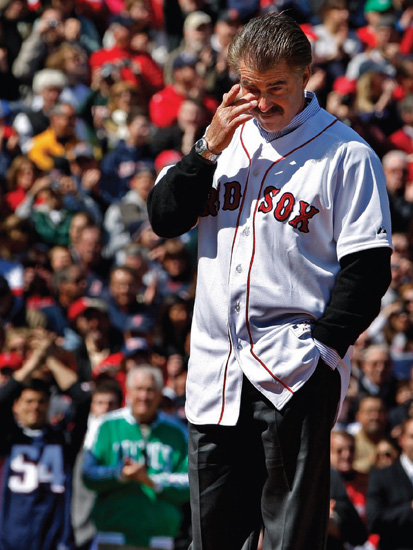
The hangover continued through the following season as Boston finished 20 games out in fifth place in 1987, posting a losing record (78-84) for only the second time in 21 years. Things had begun trending downward during spring training when both Hurst and Boyd were injured and Clemens held out; the club already was 0-3 when the pennant was hoisted at the home opener. “It made me mad,” said Evans, after the players received rings for winning the American League the previous season. “There should have been ‘World Championship’ on that ring.”
By early May, the Sox already were sagging badly after dropping eight of 10 on a trip to Texas and the West Coast. Just after mid-month, they were buried in sixth place and never rose above fifth for the rest of the season. “I’m just waiting now for October 4
th
to get here,” McNamara remarked on September 23. The dismal season wasn’t the manager’s fault, Lou Gorman declared. “There’s no way you can blame him for this year,” the general manager concluded. “I’m sure some people will do it, but I don’t think he’s responsible at all for the kind of season we’ve had.”